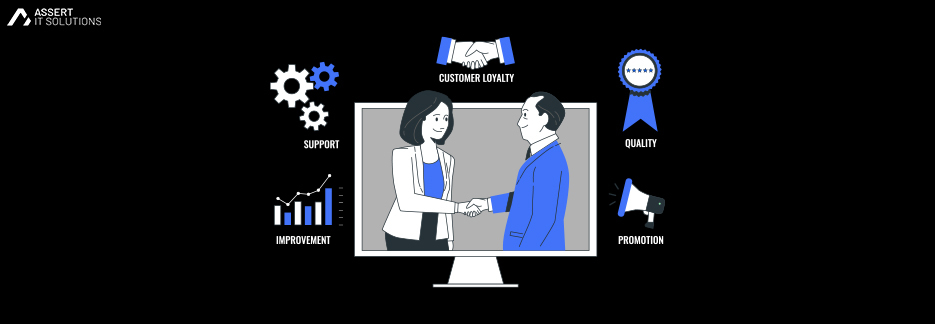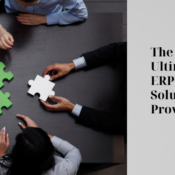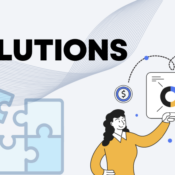
04/21/2022
/
Benefits and use of ERP for Small Size Business
Want to gain control over your small or medium-sized business? No business is too small to act, appear and operate as a full-fledged enterprise with the support of ERP Solutions.
Connecting and managing end-to-end operational processes streamline business solutions for improved functioning to render unprecedented efficiency to it.
 Tasks like accounting, manufacturing, and project management require accuracy and quick actions. Depending on an automated ERP system delivers more efficiency to the process to make it approachable.
Businesses are using ERP solutions to tackle their business challenges, apply accurate real-time data to make better business decisions and to streamline and standardize processes. It gives them a crucial metric analysis to set up dashboards modules and custom alerts as per the pending task. It can be used across a number of devices, including smartphones, tablets, and laptops as more and more technologies like .NET, SQL, and HTML5 are being utilized. Modern ERP business solutions allow businesses to utilize multiple features to simplify the business process.
Tasks like accounting, manufacturing, and project management require accuracy and quick actions. Depending on an automated ERP system delivers more efficiency to the process to make it approachable.
Businesses are using ERP solutions to tackle their business challenges, apply accurate real-time data to make better business decisions and to streamline and standardize processes. It gives them a crucial metric analysis to set up dashboards modules and custom alerts as per the pending task. It can be used across a number of devices, including smartphones, tablets, and laptops as more and more technologies like .NET, SQL, and HTML5 are being utilized. Modern ERP business solutions allow businesses to utilize multiple features to simplify the business process.

What is ERP?
Enterprise Resource Planning Software is an application-integrated system used for managing and automating the business process flow of backend functions in several departments of the organisation. Reflecting on the underlying idea is the fact that it harmonizes the flow of information between the different business processes to maintain a balance.What Industries use ERP Solutions?
Industries, like Banking, Construction, manufacturing, chemical, oil/gas marketing, human resources, retail, pharmaceutical, Industrial Services, Distribution, Healthcare, Professional Services, and Service-related industries, use ERP software solutions. Though its application is not limited to these industries, it can be used as per the requirement of the enterprise. Every industry has unique requirements, implementing modules based on the industry requirement can help monitor and perform accordingly.Wondering which ERP software is reliable and best for your business? Don't worry. Try Logway (a complete ERP solution for every business). Enquire now for 7 day free trial. Email us at business@assertit.io
What Do Small Businesses Need to Understand about ERP?
 Tasks like accounting, manufacturing, and project management require accuracy and quick actions. Depending on an automated ERP system delivers more efficiency to the process to make it approachable.
Businesses are using ERP solutions to tackle their business challenges, apply accurate real-time data to make better business decisions and to streamline and standardize processes. It gives them a crucial metric analysis to set up dashboards modules and custom alerts as per the pending task. It can be used across a number of devices, including smartphones, tablets, and laptops as more and more technologies like .NET, SQL, and HTML5 are being utilized. Modern ERP business solutions allow businesses to utilize multiple features to simplify the business process.
Tasks like accounting, manufacturing, and project management require accuracy and quick actions. Depending on an automated ERP system delivers more efficiency to the process to make it approachable.
Businesses are using ERP solutions to tackle their business challenges, apply accurate real-time data to make better business decisions and to streamline and standardize processes. It gives them a crucial metric analysis to set up dashboards modules and custom alerts as per the pending task. It can be used across a number of devices, including smartphones, tablets, and laptops as more and more technologies like .NET, SQL, and HTML5 are being utilized. Modern ERP business solutions allow businesses to utilize multiple features to simplify the business process.
What Are the Signs That Your Business Needs an ERP?
Whether you lost your track of inventory or struggled to maintain the recent sales detail, mismanagement can be chaotic for businesses and can hamper productivity and profitability. Also, in a small company, the staff is limited to its assigned jobs, but the company has a lot to do to manage its scope. Here comes the need for ERP solutions. Implementing an ERP system into business processes and management can reduce the hassle of multiple times. Rendering more transparency and streamlined collaboration, the best ERP solutions are perhaps the most important integration.Is ERP Good For Small Businesses?
There is a myth that standard ERP software is designed to manage the needs of large enterprises, manufacturers and distributors. But its relevance in small scale industries can’t be neglected. In fact, small businesses are at high risk of unstructured solutions, ERP proofing your business can save on funds, time and resources. Manual processing of data can take time. Integrating ERP systems to automate business operations like finances, production and order processing for small businesses can reap valuable benefits. Commonly, ERP for the manufacturing industry, ERP for software companies, ERP in operations management, and ERP inventory management software are used more widely.What Benefits Do Small Businesses Get From ERP?

- Streamlined Informational Flow – For the core of enterprises, management of data and information is essential for decision making. From sales order entry and pricing to delivery and invoicing, the process contains complexities, which, when automated using ERP tools can reduce the hassle to a great extent. With a dedicated software application, all important data can be shared and becomes accessible across all departments.
- Improved Transparency and Productivity- without an ERP, a business struggles a lot to collect information from different departments and go through Excel sheets to check a report. Sounds clumsy? Collecting key data and information of all departments and making it available for all through ERP facilitates the passage. ERP system stores a master date, including manufacturing work processes, customers, products/materials, vendors, bill of material (BOM), etc.
- Cost-Effective Solutions To Control and Reduce Operating Costs With the increase in business scale, processes, human resources/employees, and growth in revenue, manual upkeep of reports becomes difficult. If your small scale business is ready to see new growth, the best ERP solution will give it an edge.
- Improved flexibility, scalability and growth Agility is the need of the hour for businesses seeking growth. An agile, flexible and scalable dedicated software application allows adjustment to adapt to market or buyers' needs. It delivers more control to the management to keep it simple and fathomable.
Conclusion
Although you may find the cost of maintaining data through an ERP solution a bit high, the benefits it brings to a small scale business can pay off well. Small businesses with long term business planning can utilize the best ERP software solutions for better coverage and control.Recent Posts
Monika Narriya/0 Comments
Why are ERP solutions important in the education sector?
Monika Narriya/0 Comments
Which is the best ERP solution provider company?
Monika Narriya/0 Comments
How do we select the right ERP solution for our businesses?
Sumit Kumar/0 Comments
9 Most In-Demand Programming Languages for 2024
Sumit Kumar/0 Comments
Best Time to Post on Social Media – 2024 Guide
Sumit Kumar/0 Comments
Why You Should Consider Semantic HTML for SEO
All Categories
- Bing
- Blockchain
- Blog
- Branding
- Case Study
- Content Marketing
- Conversion Rate Optimization
- Cryptocurrency
- Digital Currency
- Digital Marketing
- Email Marketing
- ERP Solutions
- Facebook Marketing
- Google Ads
- Google Updates
- Graphic Designing
- Hire Developers
- Image SEO
- Influencer Marketing
- IT
- Local SEO
- Machine Learning
- Mobile Application Development
- Pay Per Click
- Pinterest SEO
- Podcast Hosting
- React JS
- Reddit & Quora
- Search Engine Optimization
- SEO Copywriting
- Social Media Marketing
- Software
- Software Development
- Technology
- UX and UI
- Web Designs
- Web Hosting
- Website Development
- Website Redesigning
- YouTube SEO








